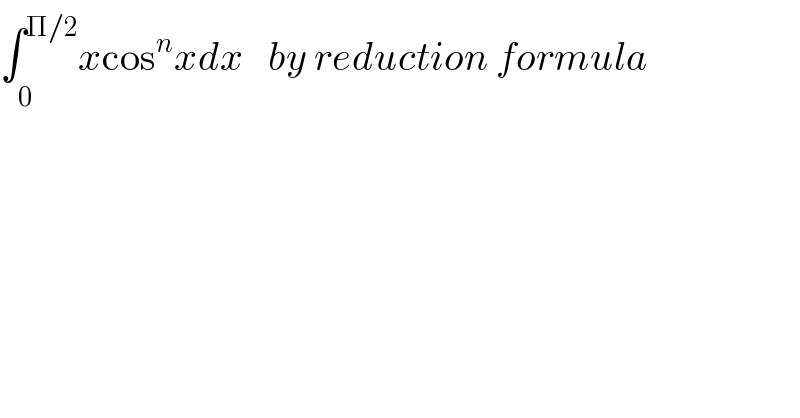
Question Number 74037 by akshaypalsra8@gmail.com last updated on 18/Nov/19

$$\int_{\mathrm{0}^{} } ^{\Pi/\mathrm{2}} {x}\mathrm{cos}^{{n}} {xdx}\:\:\:{by}\:{reduction}\:{formula} \\ $$
Answered by mind is power last updated on 18/Nov/19
![I_n =∫_0 ^(π/2) xcos^n (x)dx ⇒I_n −I_(n+2) =∫_0 ^(π/2) xcos^n (x).sin^2 (x)dx by part u(x)=xsin(x),v′(x)=cos^n (x)sin(x) I_n −I_(n+2) =[((xsin(x).cos^(n+1) (x))/(−(n+1)))]_0 ^(π/2) +(1/(n+1))∫_0 ^(π/2) cos^(n+1) (x).{sin(x)+xcos(x)}dx =(1/(n+1))∫_0 ^(π/2) cos^(n+1) (x)sin(x)dx+(1/(n+1))∫_0 ^(π/2) xcos^(n+2) (x)dx =(1/(n+1)).[((−cos^(n+2) (x))/(n+2))]_0 ^(π/2) +(I_(n+2) /(n+2))=I_n −I_(n+2) ⇒(1/((n+1)(n+2)))+(I_(n+2) /(n+2))=I_n −I_(n+2) ⇔I_(n+2) (n+3)(n+1)−(n+1)(n+2)I_n =1](Q74066.png)
$$\mathrm{I}_{\mathrm{n}} =\int_{\mathrm{0}} ^{\frac{\pi}{\mathrm{2}}} \mathrm{xcos}^{\mathrm{n}} \left(\mathrm{x}\right)\mathrm{dx} \\ $$$$\Rightarrow\mathrm{I}_{\mathrm{n}} −\mathrm{I}_{\mathrm{n}+\mathrm{2}} =\int_{\mathrm{0}} ^{\frac{\pi}{\mathrm{2}}} \mathrm{xcos}^{\mathrm{n}} \left(\mathrm{x}\right).\mathrm{sin}^{\mathrm{2}} \left(\mathrm{x}\right)\mathrm{dx} \\ $$$$\mathrm{by}\:\mathrm{part} \\ $$$$\mathrm{u}\left(\mathrm{x}\right)=\mathrm{xsin}\left(\mathrm{x}\right),\mathrm{v}'\left(\mathrm{x}\right)=\mathrm{cos}^{\mathrm{n}} \left(\mathrm{x}\right)\mathrm{sin}\left(\mathrm{x}\right) \\ $$$$\mathrm{I}_{\mathrm{n}} −\mathrm{I}_{\mathrm{n}+\mathrm{2}} =\left[\frac{\mathrm{xsin}\left(\mathrm{x}\right).\mathrm{cos}^{\mathrm{n}+\mathrm{1}} \left(\mathrm{x}\right)}{−\left(\mathrm{n}+\mathrm{1}\right)}\right]_{\mathrm{0}} ^{\frac{\pi}{\mathrm{2}}} +\frac{\mathrm{1}}{\mathrm{n}+\mathrm{1}}\int_{\mathrm{0}} ^{\frac{\pi}{\mathrm{2}}} \mathrm{cos}^{\mathrm{n}+\mathrm{1}} \left(\mathrm{x}\right).\left\{\mathrm{sin}\left(\mathrm{x}\right)+\mathrm{xcos}\left(\mathrm{x}\right)\right\}\mathrm{dx} \\ $$$$=\frac{\mathrm{1}}{\mathrm{n}+\mathrm{1}}\int_{\mathrm{0}} ^{\frac{\pi}{\mathrm{2}}} \mathrm{cos}^{\mathrm{n}+\mathrm{1}} \left(\mathrm{x}\right)\mathrm{sin}\left(\mathrm{x}\right)\mathrm{dx}+\frac{\mathrm{1}}{\mathrm{n}+\mathrm{1}}\int_{\mathrm{0}} ^{\frac{\pi}{\mathrm{2}}} \mathrm{xcos}^{\mathrm{n}+\mathrm{2}} \left(\mathrm{x}\right)\mathrm{dx} \\ $$$$=\frac{\mathrm{1}}{\mathrm{n}+\mathrm{1}}.\left[\frac{−\mathrm{cos}^{\mathrm{n}+\mathrm{2}} \left(\mathrm{x}\right)}{\mathrm{n}+\mathrm{2}}\right]_{\mathrm{0}} ^{\frac{\pi}{\mathrm{2}}} +\frac{\mathrm{I}_{\mathrm{n}+\mathrm{2}} }{\mathrm{n}+\mathrm{2}}=\mathrm{I}_{\mathrm{n}} −\mathrm{I}_{\mathrm{n}+\mathrm{2}} \\ $$$$\Rightarrow\frac{\mathrm{1}}{\left(\mathrm{n}+\mathrm{1}\right)\left(\mathrm{n}+\mathrm{2}\right)}+\frac{\mathrm{I}_{\mathrm{n}+\mathrm{2}} }{\mathrm{n}+\mathrm{2}}=\mathrm{I}_{\mathrm{n}} −\mathrm{I}_{\mathrm{n}+\mathrm{2}} \\ $$$$\Leftrightarrow\mathrm{I}_{\mathrm{n}+\mathrm{2}} \left(\mathrm{n}+\mathrm{3}\right)\left(\mathrm{n}+\mathrm{1}\right)−\left(\mathrm{n}+\mathrm{1}\right)\left(\mathrm{n}+\mathrm{2}\right)\mathrm{I}_{\mathrm{n}} =\mathrm{1} \\ $$$$ \\ $$
